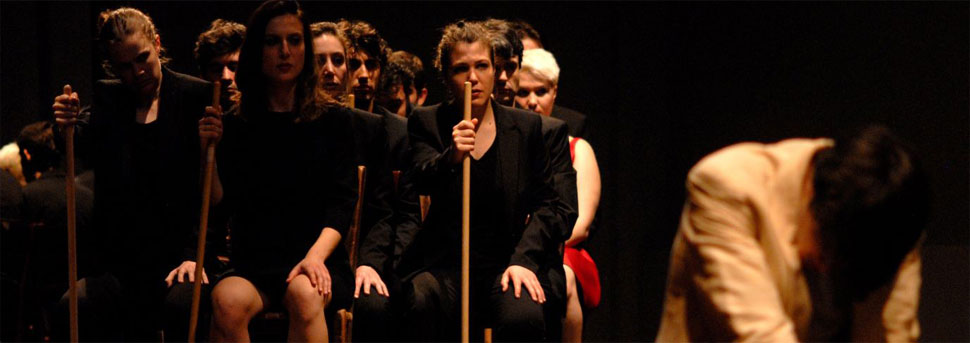from Aeschylus
adaptation Riccardo Baudino
tutor Antonio Latella and Federico Bellini
director assistant Riccardo Baudino
director Antonio Latella
characters and interpreters
Watchman Gianpaolo Pasqualino
Head choir Mariasilvia Greco
Choir Alessandro Bay Rossi, Barbara Chichiarelli, Marta Cortellazzo Wiel, Ludovico Fededegni, Christian La Rosa, Alexis Aliosha Massine, Federica Rosellini, Andrea Sorrentino, Giuliana Vigogna
Clytemnestra Ilaria Matilde Vigna
Aegistus Emanuele Turetta
Agamemnon Leonardo Lidi
Cassandra Barbara Mattavelli
Herald Isacco Venturini
project playwrights Federico Bellini and Linda Dalisi
production Emilia Romagna Teatro Fondazione
with the support of Fondazione Cassa di Risparmio di Modena
Duration 1h 15′
Played in Italian with English subtitles
in the frame of the project “At the Prospero’s School. Actors in the global net”
Agamemnon
Aeschylus’s Agamemnon is a testament. If we are to believe the writers’ heroic, scientific and tragic fables, we find ourselves before the first chapter of the only trilogy that survived the burning of the papyrus scrolls: the Oresteia, dawn of Western theatre.
What happened in Athens in 458 B.C.? It’s wonderful to imagine that the old poet Aeschylus (425 – 456) won the Great Dionysia. Agamemnon, The Coefore, The Eumenides: one musical monolith narrating a man’s dream. After fighting the Persians in Marathon, Salamis and Plataea, and seeing his brother die, Aeschylus, the warrior poet, had the strength to present his dream to humanity. A dream that, in the midst of a failing democracy, cries for a new order – where violence is a topic to be shared and destiny a concept to be loved and discussed amongst men in the tribunals, theatres, streets and at home.
It speaks of the all-too-human Atreides family. Following the Trojan war, Agamemnon goes back to Argos, where his wife, Queen Clytemnestra, awaits him.
Clytemnestra has chosen Aegisthus, son of Thyestes, brother of Atreus, father of King Agamemnon and Menelaus, as her lover. Atreus killed Thyestes’s sons, had them cooked and deceitfully served to their own brother to be eaten. Now, Clytemnestra and Aegisthus want to kill Agamemnon: Aegisthus to avenge his father, Clytemnestra to avenge her daughter, Iphigenia, sacrificed by Agamemnon so that the wind could fill the sails of the Greek ships setting towards Troy. Ruthless and inescapable, the murder is carried out. The chorus of the elder noblemen of Argos, incapable of acting and taking a stand, witnesses helplessly.
How is one to tackle the Agamemnon – a perfect play – with the necessary humility and arrogance necessary to translate it for the contemporary audience? Luckily, a perfect play is also timeless. Maybe listening to it is enough – even if very difficult. Our dramaturgic and directorial attempt was precisely this: listen to Aeschylus’s music – both the original and the great translations of Cantarella and Pasolini – and then make a choice. As for the chorus, we have chosen a linguistic evolution – from ancient Greek through Latin, Alfieri and Leopardi’s “heroic” Italian, 20th century poetry to rap music – that could express the changing willingness and contradictions of those who are governed. As for the so-called heroes, we have chosen a “timeless”, static – though very much alive – language to express the contradictions that stand at the foundations of humankind through every age. The basic cell of all the language in our libretto is a “Pasolinian” tercet, beautiful and broken; the form we thought most apt to translate, today, the music we heard in Aeschylus’s words.
The direction has embodied the verses, giving space, power and predominance to the “nameless” characters, the tragedy’s and life’s misers: first of all, the Guardian, the dog of the Atreides, forced by Queen Clytemnestra to gaze into the darkness waiting for the flame – the fire signal announcing the end of the war and king Agamemnon’s return.
Riccardo Baudino


